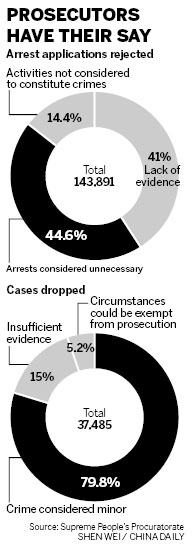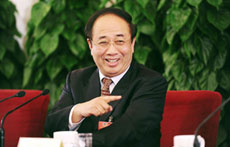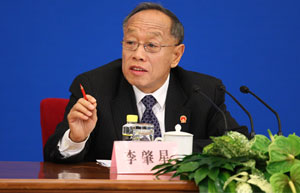Prosecutors eye scales of justice
By Wang Jingqiong (China Daily)
Updated: 2011-03-12 07:35
 |
BEIJING - Judicial organs across the country have improved self-supervision and tightened procedural examination to prevent wrongdoing and ensure justice, the country's top prosecutor and judge said on Friday.
Prosecutors in the country last year ended police detention of 525 suspects who were held longer than allowed, said Cao Jianming, chief of the Supreme People's Procuratorate.
Prosecutors also rejected arrest applications filed by police for 143,891 criminal suspects - an increase of about 17 percent over the previous year - due to insufficient evidence or lack of necessity, according to the report.
In addition, prosecutors dropped the prosecution of 37,485 criminal suspects last year, up 13.4 percent compared with 2009, because of lack of evidence or because the crime was too minor, the report said.

Meanwhile, prosecutors also played a role in supervising the court system and appealed the verdicts of 5,425 criminal cases they thought were unfair, up 37 percent year-on-year, according to the report.
According to Chinese law, prosecutors have the rights and obligations to oversee litigant activities and can urge police and court organs to correct mistakes.
"This year we'll continue to play our role as the supervisor of the country's legal system," Cao said. "We'll make special efforts in supervising illegal investigations including forced confessions, trials in which convicts are handed too severe or too light sentences, and illegal law enforcement."
Wang Shengjun, president of the Supreme People's Court, also said on Friday the top court will continue to prevent wrongful cases caused by illegal procedures including confession gained through torture, and judges showing favor when meting out sentences.
"We'll lay equal stress on cracking down on crimes and protecting suspects' rights. We'll follow strict procedures to exclude illegal evidence and prevent wrongful cases," he said.
Last year, the case of Zhao Zuohai, a villager from Central China's Henan province, who had been imprisoned for 11 years until the man he had allegedly murdered turned up alive last April, sparked public discussion over the credibility of the legal system. Zhao later said he confessed after police torture.
Wang, while acknowledging that some judges in the country were found to be taking bribes and abusing power in handing down verdicts, stressed that the top court has been working hard to improve itself and prevent injustice.
The top court issued two regulations in February aimed at preventing injustice. One stipulates that judges who have a spouse or offspring working as a lawyer in the same judicial area must declare a conflict of interest and one of them must shift to a different area.
The other stipulates that judges and other court officials are banned from privately meeting litigants of the lawsuits they handle.
"These new measures and new figures released today (Friday) show that the top court and procuratorate have realized the importance of self-supervision," said Tang Hongxin, a Beijing-based lawyer.
"It is of course a good signal, but more supervision from outside the legal system should be introduced in addition to self-supervision."
Prosecutors and judges also intensified their efforts to fight corruption last year.
Prosecutors investigated 44,085 people in 32,909 work-related crimes in 2010, respectively registering a year-on-year increase of 6.1 percent and 1.4 percent, Cao said.
A total of 2,723 corrupt officials at or above the county level were investigated in 2010, including 188 at the prefecture level and six at the ministerial level, he said.
The top court also reported that courts across the country last year concluded 27,751 cases of embezzlement, bribery and malfeasance, and sentenced 28,652 criminals involved, up by 7.1 percent and 9.2 percent respectively.
In 2011, Cao said, the procuratorate system will target corruption and officials' misconduct behind major accidents and "mass incidents", usually referring to protests and illegal gatherings.







